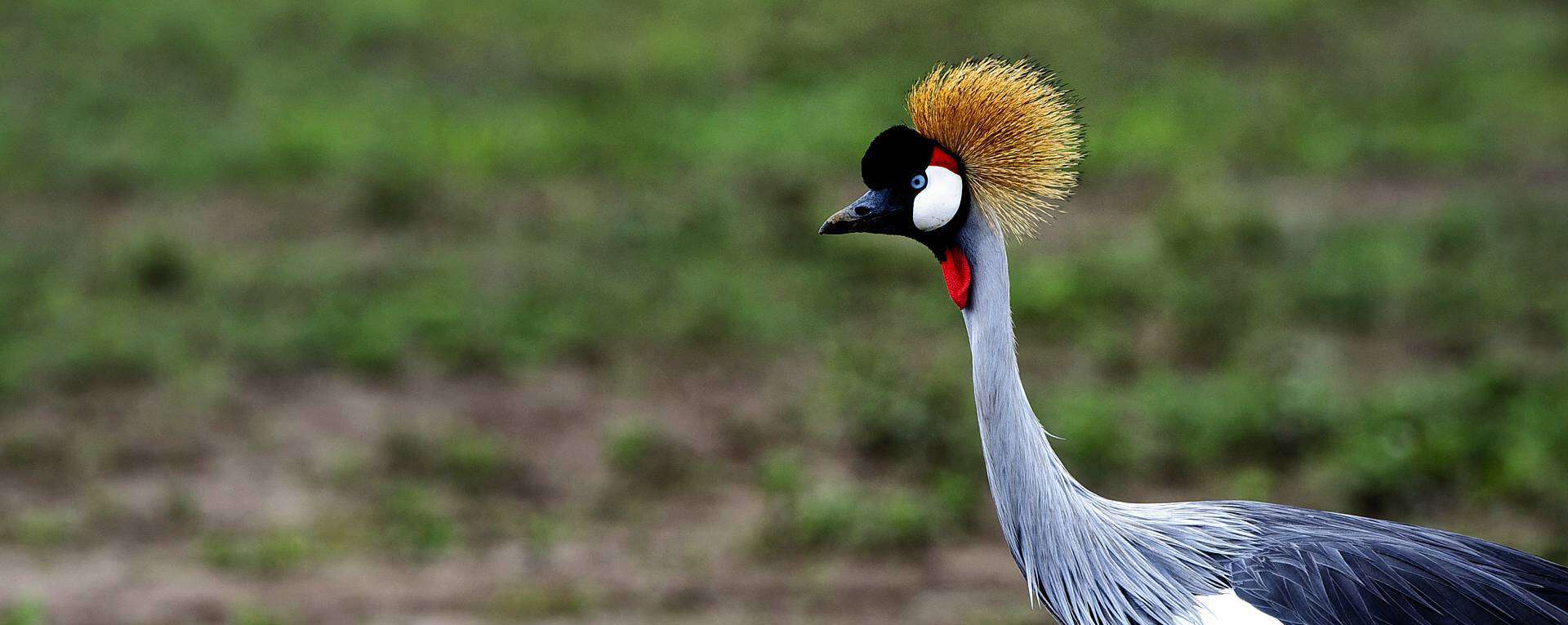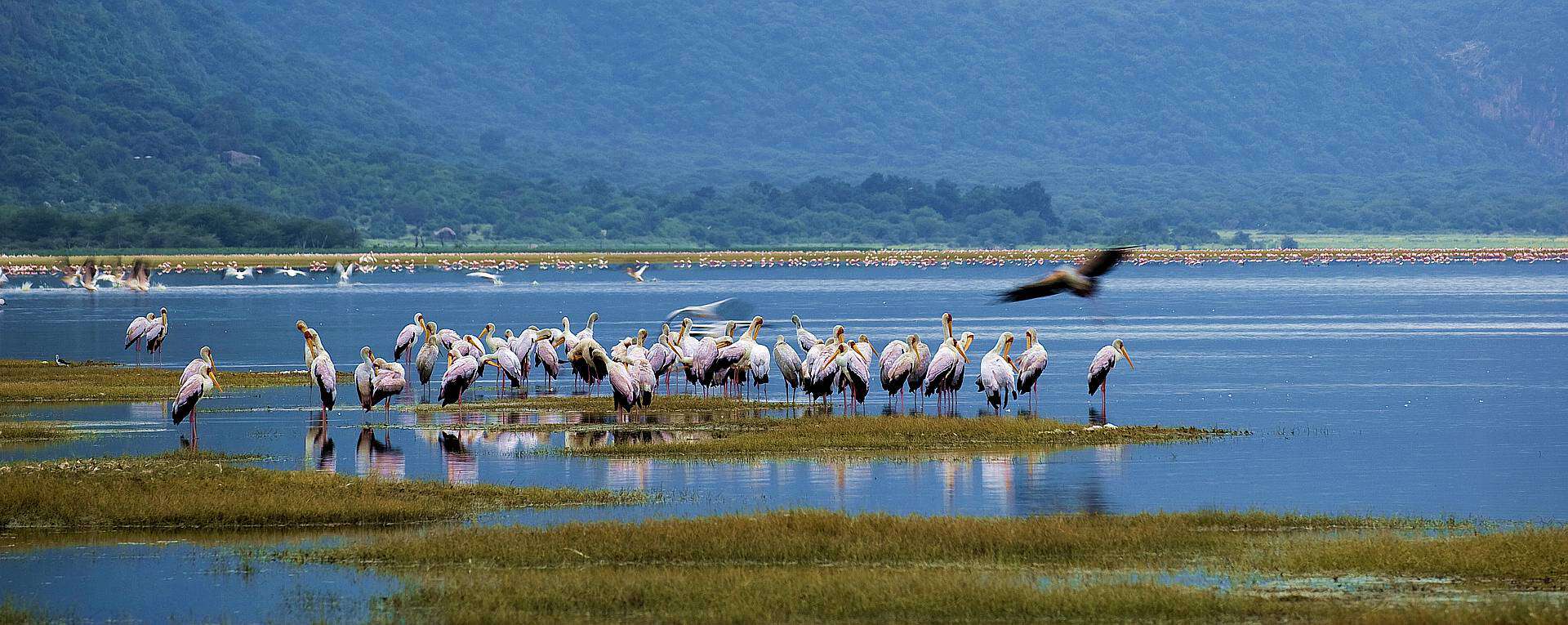

- Services
- Places to go
- Serengeti National Park
- Ngorongoro Crater
- Tarangire National Park
- Lake Manyara National Park
- Selous game reserve
- Ruaha National Park
- Mkomanzi National Park
- Mikumi National Park
- Saadan National Park
- Katavi National Park
- Kitulo National Park
- Mahale mountains National Park
- Udzungwa mountains National Park
- Gombe National Park
- Wildlife Safaris
- Kilimanjaro
- Our rates
- Covid-19 updates
- Balloon Safaris
Bird watching
Tanzania is an excellent destination for birders. Besides Lake Manyara and Arusha National Parks which are famous for water birds and other savannah and forest species, all the game parks in Tanzania have an amazing array of birdlife including Eurasian migrants. The most interesting part is that the birdlife may vary from park to park depending on habitats providing a richer viewing experience to the birder. It may be useful to learn that over 1,130 different species of birds have been recorded in Tanzania – the largest number in Africa second only to the Democratic Republic of Congo.Tanzania is one of the finest bird watching destinations in Africa, with 1140 species including 200 migrants and 74 marine birds present. Tanzanian avian safaris are best in the rains for migrants and residents in breeding plumage. The preeminent birding locations include Arusha National Park, with 400 birds in a diversity of habitats contained in a small area. You may observe on a white-faced whistling duck, with its whistling three-note lament, or a dusky flycatcher. Tawny eagles and buzzards hover above Ngurdoto Crater, whilst the Momella Lakes is the place for water birds and waders. Lake Manyara National Park offers pink flamingos, pelicans, storks, cormorants, hornbills and many more with over 400 recorded species. Greater and lesser flamingos are also found in Ngorongoro Crater and millions mass on their breeding ground at Lake Natron.
Tarangire’s swamps are home to over 550 species, with weighty kori bustards, ostriches, secretary bird and helmeted guinea fowls on the drier plains, where weavers and lovebirds are also common. A Serengeti 500 birding species safari reveals endemic Fischer’s lovebird, a bright-hued small parrot also found in Ngorongoro Conservation Area, grey crowned crane, and the brown snake eagle. Buff-crested bustards and spike-heeled larks nest on the plains below Mount Kilimanjaro, best known for Abbot’s starlings with white bellies and purple capes, alpine hill chats and scarlet-tufted malachite sunbirds, whilst lammergeyer haunt its upper slopes. A bird watching trip to the southern parks with AfricanMecca overlaps the ranges of both southern and eastern species. With over 440 recorded listing for the vast Selous Game Reserve, the Rufiji and the Great Ruaha Rivers provides ideal habitats for mangrove kingfishers, yellow-billed stork, malachite kingfishers, African skimmers and palm-nut vultures.
A twitchers paradise, Ruaha National Park holds 570 species including the yellow-collared sunbird, giant kingfisher and ashy starling. Katavi also has a large population of waterfowl in the wet season. Zanzibar protects 268 species including great frigatebird, African paradise flycatcher, forest batis, buff-spotted flufftail and stunning Fischer’s turaco with iridescent blue cap and wings. An African birding holiday among the river inlets and mangroves of Saadani finds many migratory waders amongst their 400 species. The Eastern Arc Mountains are important with 30 short-range endemic species.
Kitulo Plateau National Park is the place to spot the blue swallow and Denham’s bustard whilst Mkomazi Game Reserve shelters Friedmann’s lark and Shelley’s starling. The Udzungwa mountain forests protect Udzungwa partridge, olive-flanked robin-chat, white-chested alethe, and Sharpe’s akalat. The Uluguru Mountains contain loveridge’s sunbird and the Uluguru bush-shrike. While Usambara Mountains are not well-studied, a forest birding watching tour will find globally threatened Usambara eagles, Sokoke and scops owls, long-billed tailor birds, and Usambara weavers, whilst Lindi coastal forests contain Livingstone’s flycatcher and southern banded snake eagles. Chugu Tanzania Adventure Safaris can customize a Tanzanian avian vacation to visit the most likely feathered habitats with a trained spotter and guide to assist you to add many amazing checkmarks, birding photos and videos to your visual checklist.



